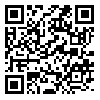Volume 4, Issue 3 (Spring 2019)
Health in Emergencies and Disasters Quarterly 2019, 4(3): 147-156 |
Back to browse issues page
Download citation:
BibTeX | RIS | EndNote | Medlars | ProCite | Reference Manager | RefWorks
Send citation to:



BibTeX | RIS | EndNote | Medlars | ProCite | Reference Manager | RefWorks
Send citation to:
Latif M, Abbasi M, Momenian S. The Effect of Educating Confronting Accidents and Disasters on the Improvement of Nurses’ Professional Competence in Response to the Crisis. Health in Emergencies and Disasters Quarterly 2019; 4 (3) :147-156
URL: http://hdq.uswr.ac.ir/article-1-241-en.html
URL: http://hdq.uswr.ac.ir/article-1-241-en.html
1- Department of Nursing, Faculty of Nursing and Midwifery, Qom University of Medical Sciences, Qom, Iran.
2- Department of Nursing, Faculty of Nursing and Midwifery, Qom University of Medical Sciences, Qom, Iran. ,mohamad_abbasi55@yahoo.com
2- Department of Nursing, Faculty of Nursing and Midwifery, Qom University of Medical Sciences, Qom, Iran. ,
Abstract: (7485 Views)
Background: To achieve the highest possible level of health for individuals and societies involved in the crisis, a high level of individual and professional competency is needed in nurses for their active participation in the crisis. The acquisition of professional qualifications by nurses to provide care in the crisis is very important. The present study aimed to determine the effect of disaster and accident response training on the enhancement of professional competence of nurses in response to the crisis.
Materials and Methods: This research was a quasi-experimental study with pre-test, post-test design. The statistical population consisted of all nurses working in Shahid Chamran Hospital in Saveh City, Iran, in 2017. In total, 80 nurses were selected through the convenience sampling method and were randomly divided into the intervention and control groups. The intervention group received training through lectures and workshops for 16 hours in 4 days. The samples completed a professional nursing competency assessment questionnaire before and one month after the intervention. The obtained data were analyzed by the Chi-squared test, Fisher’s exact-test, Independent samples t-test, and Paired samples t-test in SPSS.
Results: The findings revealed no significant difference between the two groups concerning demographic variables. After the intervention, the average improvement of professional competence of nurses in their ability to manage the accident scene increased from 63.3 to 74.07, teamwork skill from 56.7 to 74, individual specific abilities from 61.4 to 70, ethical performance from 67.8 to 76.9, and professional skills from 54 to 60. The Mean±SD pretest score of professional competency of nurses in the intervention and control groups were 163.5±28.6 and 155.73±34, respectively. After the intervention, these scores increased to 185.13±28.8 and 158.48±33.3 in the intervention and the control groups, respectively. The difference was statistically significant in the intervention group (P<0.001).
Conclusion: The findings of this study indicated that the competence of nurses to provide care in crises was not at a desirable level. Thus, assessing the competence of nurses and identifying the gaps in their knowledge and skills before attending crises is essential. Also, the incident and disaster education can dramatically increase nurses’ professional competence in responding to the crisis. Therefore, we suggest the method used in this study as a feasible, simple, low cost and effective method in this regard.
Materials and Methods: This research was a quasi-experimental study with pre-test, post-test design. The statistical population consisted of all nurses working in Shahid Chamran Hospital in Saveh City, Iran, in 2017. In total, 80 nurses were selected through the convenience sampling method and were randomly divided into the intervention and control groups. The intervention group received training through lectures and workshops for 16 hours in 4 days. The samples completed a professional nursing competency assessment questionnaire before and one month after the intervention. The obtained data were analyzed by the Chi-squared test, Fisher’s exact-test, Independent samples t-test, and Paired samples t-test in SPSS.
Results: The findings revealed no significant difference between the two groups concerning demographic variables. After the intervention, the average improvement of professional competence of nurses in their ability to manage the accident scene increased from 63.3 to 74.07, teamwork skill from 56.7 to 74, individual specific abilities from 61.4 to 70, ethical performance from 67.8 to 76.9, and professional skills from 54 to 60. The Mean±SD pretest score of professional competency of nurses in the intervention and control groups were 163.5±28.6 and 155.73±34, respectively. After the intervention, these scores increased to 185.13±28.8 and 158.48±33.3 in the intervention and the control groups, respectively. The difference was statistically significant in the intervention group (P<0.001).
Conclusion: The findings of this study indicated that the competence of nurses to provide care in crises was not at a desirable level. Thus, assessing the competence of nurses and identifying the gaps in their knowledge and skills before attending crises is essential. Also, the incident and disaster education can dramatically increase nurses’ professional competence in responding to the crisis. Therefore, we suggest the method used in this study as a feasible, simple, low cost and effective method in this regard.
Type of Study: Research |
Subject:
Special
Received: 2018/12/15 | Accepted: 2019/05/6 | Published: 2019/07/23
Received: 2018/12/15 | Accepted: 2019/05/6 | Published: 2019/07/23
Send email to the article author
| Rights and permissions | |
 |
This work is licensed under a Creative Commons Attribution-NonCommercial 4.0 International License. |








